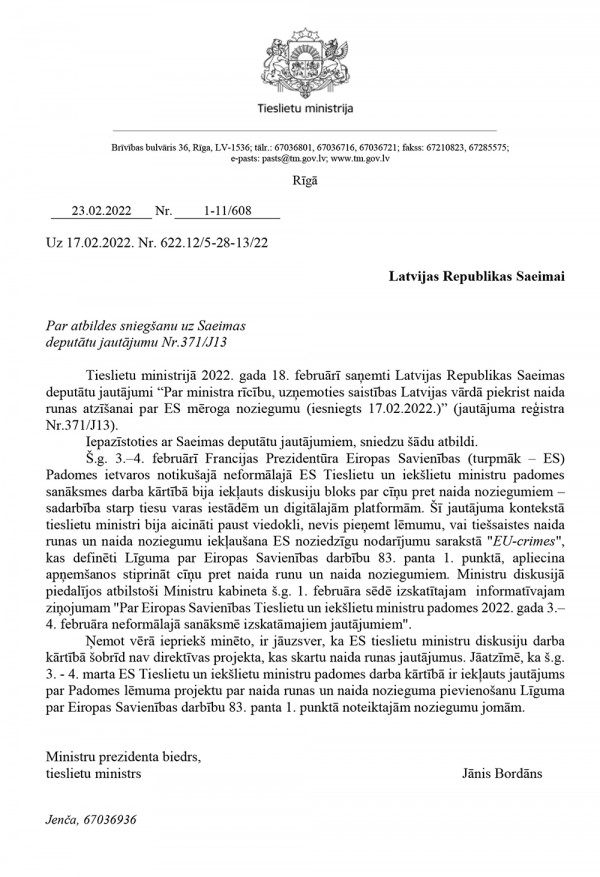Latvia will support the criminalization of freedom of expression/hate speech
Latvia's position on the criminalization of hate speech at the European Union level has been given restricted access status. Today it is being considered by the Saeima European Affairs Committee. However, in the light of the report of the Ministry of Justice, which was examined by the Cabinet of Ministers earlier, and the personal position of Minister Jānis Bordāns, expressed at the informal meeting of European ministers in February, there is no reason to doubt that the ruling coalition is in favor of restricting freedom of expression in its harshest form.
Although all minds seem to be preoccupied at the moment with Russia's criminal invasion of Ukraine, there are things in Latvian and EU policy that are stubbornly pushed forward, even in such extreme circumstances, as if they were just as important. One of them is the criminalization of hate speech, and in principle the Latvian government has already said that it agrees with this radical step, without first consulting the Latvian public or the legislature.
The ministers in Lille only talked
At the beginning of February, the informal meeting of the Justice and Home Affairs Council of the European Union took place in Lille, France, and the Latvian Minister of Justice, Deputy Prime Minister Jānis Bordāns, took there a conceptual agreement on behalf of Latvia. It was then revealed that the Saeima had no knowledge of this and that "Bordāns must explain to the MPs the concealment of Latvia's position." Several MPs submitted a formal question "On the Minister's action in committing Latvia to agreeing to the recognition of hate speech as an EU-wide crime". The request of the MPs cannot be ignored even if the MPs represent the opposition and the respondent is a Deputy Prime Minister. So Bordāns replied that he had not agreed on behalf of Latvia to criminalize hate speech at the EU level at the informal meeting, but had merely expressed an opinion.
Reply to MPs

Here is a quote from the Minister's reply to MPs:
"(...) The informal EU Justice and Home Affairs Council meeting included a panel on combating hate crime - cooperation between judicial authorities and digital platforms. In the context of this issue, Justice Ministers were invited to express their views, not to decide whether online hate speech and hate crime should be included in the list of EU-crimes, as defined in Article 83(1) of the Treaty on the Functioning of the European Union, demonstrates a commitment to strengthening the fight against hate speech and hate crime." This reply does not change the substance of the case, because the opinion will be followed by a decision, and the result of the decision, if no country vetoes it, will ultimately be a binding EU directive. The Cabinet of Ministers has accepted a report by the Ministry of Justice in favor of the criminalization of hate speech. Although Latvia's official position is kept secret in the Saeima, there is no reason to believe that Latvia will put obstacles in the way of restricting freedom of expression. The EU Justice and Home Affairs Council Ministers meeting is taking place already on March 3-4, when Latvia will give its official consent to the plan by the European Commission and the French Presidency to restrict freedom of expression.
The accompanying information report, which has been examined by the European Affairs Committee, states:
"Latvia supports in concept the inclusion of hate speech and hate crimes in the list of crimes defined by the European Union under Article 83(1) TFEU, which would thus ensure an effective and comprehensive approach at European Union level and facilitate cooperation between the Member States in combating this type of crime and protecting victims."
Without hate - for war?
What can the criminalization of hate speech do to democracy and freedom of expression? That any dissenting opinion and any thought that differs from the generally accepted opinion can be criminalized and persecuted in any European country. A dissenting opinion that the authorities consider to be hostile will be treated as a serious crime, such as terrorism, human trafficking, sexual exploitation of children, illegal drugs and arms trafficking. The main basis for the criminalization of hate speech is the conservative public's critical attitude towards the spread of LGBT ideology as well as the invasion of Muslim migrants into Europe. It is not clear how such a directive will affect freedom of speech in the context of other processes and developments in European society, such as Russia's invasion of Ukraine. After all, hate speech will be targeted on both sides of the divide. Practice will show - it is no coincidence that the State Police has already announced that it is setting up a special Internet police unit that will filter individuals' communications in the virtual environment and, if necessary, take action against those who express hate speech. But what exactly is hate speech? Anything. Any statement about anything, and you will be able to persecute any politician, journalist, artist. Every citizen of the European Union. This is the definition accepted by the Council of Europe: "the term 'hate speech' shall be understood as covering all forms of expression which spread, incite, promote or justify racial hatred, xenophobia, anti-Semitism or other forms of hatred based on intolerance, including: intolerance expressed by aggressive nationalism and ethnocentrism, discrimination and hostility against minorities, migrants and people of immigrant origin."
It should only be reminded that Ukraine is currently being invaded in large numbers by people of foreign origin and that only aggressive nationalism, hostility against invaders and undying love of the country are still keeping the country from destruction.